So we covered Bayern and Dortmund last week but there are 16 more teams to go as we recap the first half of the Bundesliga. If you loved reading about Lewandowski, Costa, and Reus surely you can't turn down a chance to read about Pascal Groß, Vladimir Darida, and Anthony Modeste even more. Let's begin with the race for 3rd: Schalke  At the start of the year they looked the least likely of the Big 6 to grab a Champions League spot and while they are a point ahead of Wolfsburg at the break, not much has changed there.
At the start of the year they looked the least likely of the Big 6 to grab a Champions League spot and while they are a point ahead of Wolfsburg at the break, not much has changed there.  The most notable accomplishment of a bland first half is the symmetry they reached with exactly 23 goals for and against along with exactly 253 shots for and against. Both are solidly above the league average, meaning if you like to see attacking play from both teams, Schalke haven't been a bad watch. The Revierderby with Dortmund was one of the most entertaining games of the year so far. One of the big reasons they don't look like a true contender for the Champions League places has been the ease at which opponents cut through the midfield. Their defensive passing map tells the story:
The most notable accomplishment of a bland first half is the symmetry they reached with exactly 23 goals for and against along with exactly 253 shots for and against. Both are solidly above the league average, meaning if you like to see attacking play from both teams, Schalke haven't been a bad watch. The Revierderby with Dortmund was one of the most entertaining games of the year so far. One of the big reasons they don't look like a true contender for the Champions League places has been the ease at which opponents cut through the midfield. Their defensive passing map tells the story: 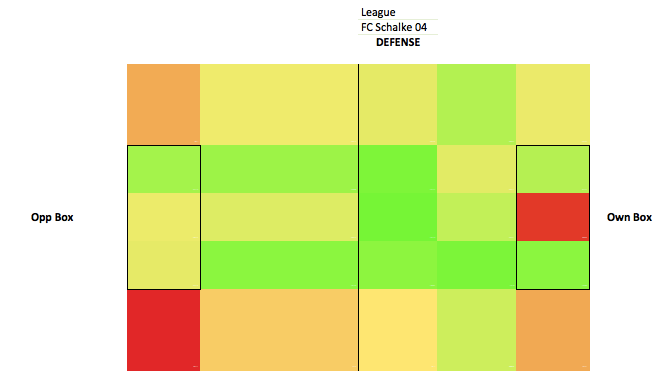 They have been able to keep opponents from getting high quality shots from these strolls through the center, and a lot of the credit has been given to Joel Matip, the in-demand center back who has popped up on several teams of the year and is rumored to be heading to Liverpool. If that's true, it probably does not reflect well on the entire team set up that one single player gets so much credit on a team muddling along in 6th with a 0 goal difference. Before I get too negative, I will point out this has been a step forward from the disastrous and short Di Matteo experiment of last season where Schalke were below par in both shots and territory. Only Stuttgart has seen their TSR improve as much as Schalke has from last year to now. That's not that surprising for a team with such a big payroll following a down year but it's not good enough to be a true contender for the Champions League without further improvement.
They have been able to keep opponents from getting high quality shots from these strolls through the center, and a lot of the credit has been given to Joel Matip, the in-demand center back who has popped up on several teams of the year and is rumored to be heading to Liverpool. If that's true, it probably does not reflect well on the entire team set up that one single player gets so much credit on a team muddling along in 6th with a 0 goal difference. Before I get too negative, I will point out this has been a step forward from the disastrous and short Di Matteo experiment of last season where Schalke were below par in both shots and territory. Only Stuttgart has seen their TSR improve as much as Schalke has from last year to now. That's not that surprising for a team with such a big payroll following a down year but it's not good enough to be a true contender for the Champions League without further improvement. 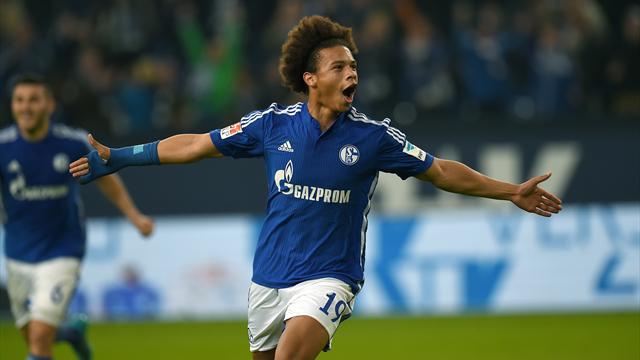 The man of the moment is Leroy Sané. He's an example of the importance of scouting when it comes to transfers. His numbers are fine enough passing, dribbling, and defending when compared to other wingers of similar repute. His main edge over your standard good winger has been his ability to get inside the box to get shots off.
The man of the moment is Leroy Sané. He's an example of the importance of scouting when it comes to transfers. His numbers are fine enough passing, dribbling, and defending when compared to other wingers of similar repute. His main edge over your standard good winger has been his ability to get inside the box to get shots off. 
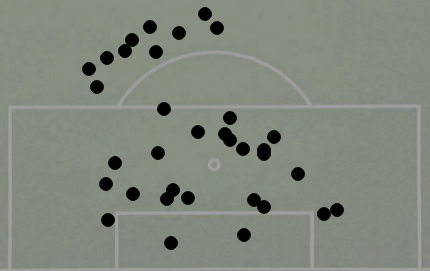 Sané can be a little peripheral at times during games and doesn't create a huge amount for his teammates, but the guy is still 20. His statistical profile is one of a very good attacking player, maybe even great. Is he good enough for Barcelona and Manchester City? That's probably beyond a simple statistical analysis. We can flag him as a generally very good prospect but the underlying skills, work ethic, and ability to learn remain beyond the spreadsheet. Leverkusen
Sané can be a little peripheral at times during games and doesn't create a huge amount for his teammates, but the guy is still 20. His statistical profile is one of a very good attacking player, maybe even great. Is he good enough for Barcelona and Manchester City? That's probably beyond a simple statistical analysis. We can flag him as a generally very good prospect but the underlying skills, work ethic, and ability to learn remain beyond the spreadsheet. Leverkusen 
 It was a disappointing first half for Schmidt's side, Chicharito's goal totals and American TV numbers aside. While Bayern and Dortmund saw their games move forward, Leverkusen saw their game drop a little in the first half despite seeming ready to make the leap when the season kicked off. The crazy press that they are known for has slacked a slight bit this season, opponents are completing more passes (even been pipped by Ingolstadt in the high press deparment) and more worryingly are getting it into dangerous areas significantly more often.
It was a disappointing first half for Schmidt's side, Chicharito's goal totals and American TV numbers aside. While Bayern and Dortmund saw their games move forward, Leverkusen saw their game drop a little in the first half despite seeming ready to make the leap when the season kicked off. The crazy press that they are known for has slacked a slight bit this season, opponents are completing more passes (even been pipped by Ingolstadt in the high press deparment) and more worryingly are getting it into dangerous areas significantly more often. 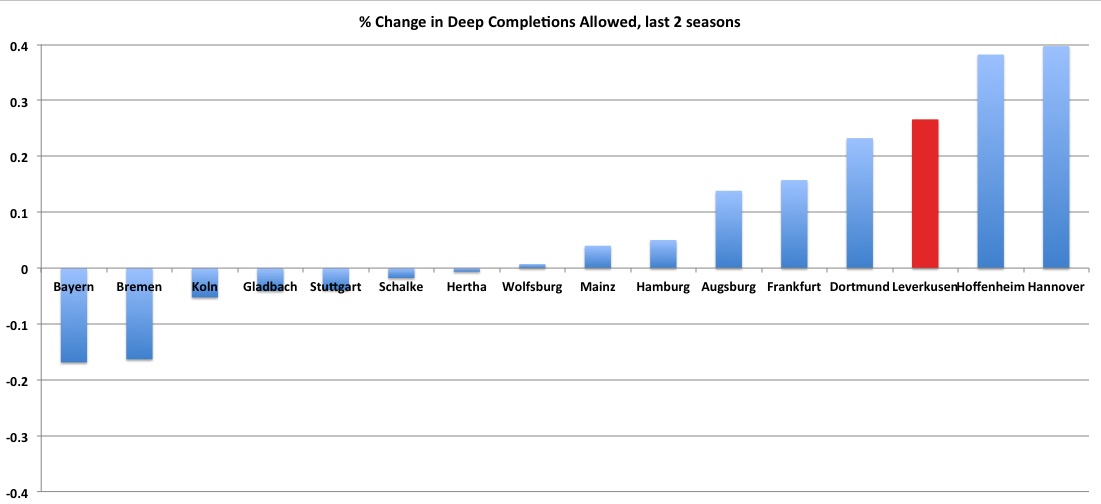 They don't have the game state reason that Dortmund do (Dortmund are ahead 53% of the time this year compared to just 28% last season which usually leads to more deep completions and shots allowed). Leverkusen actually lead only 22% of the time this season compared to 34% and trail equally more. This data suggests this fall is even worse than it appears at first blush. This slowdown on defense might conceivably be a part of an attempted tactical shift. I long clamored for Leverkusen to try to play with the ball more, as they often lost it carelessly while rushing forward. This year that has changed as they are completing 65% of their passes in the opposition half, well up from last years below league average 58%. The pace of play has slowed as significantly fewer passes are being bombed into the final third. The improved ball control hasn't quite translated to the fundamental metrics. Deep comps are level to last year, shots down a bit. There are lots of individual performances that seem impressive (Chicharito, Wendell, Kampl, and Calhanoglu in particular) and visually Leverkusen still look great sporadically but something just isn't quite adding up. The seeming attempted change in strategy hasn't made the attack any better and has taken away from their identity of high pressure D that flusters opponents. Opponents can actually feel comfortable with the ball near Leverkusen's goal this season, that's something that just never happened when they were at their best. Last year they forced opponents into hopeful long balls when attacking, while this year they are very close to league average there.
They don't have the game state reason that Dortmund do (Dortmund are ahead 53% of the time this year compared to just 28% last season which usually leads to more deep completions and shots allowed). Leverkusen actually lead only 22% of the time this season compared to 34% and trail equally more. This data suggests this fall is even worse than it appears at first blush. This slowdown on defense might conceivably be a part of an attempted tactical shift. I long clamored for Leverkusen to try to play with the ball more, as they often lost it carelessly while rushing forward. This year that has changed as they are completing 65% of their passes in the opposition half, well up from last years below league average 58%. The pace of play has slowed as significantly fewer passes are being bombed into the final third. The improved ball control hasn't quite translated to the fundamental metrics. Deep comps are level to last year, shots down a bit. There are lots of individual performances that seem impressive (Chicharito, Wendell, Kampl, and Calhanoglu in particular) and visually Leverkusen still look great sporadically but something just isn't quite adding up. The seeming attempted change in strategy hasn't made the attack any better and has taken away from their identity of high pressure D that flusters opponents. Opponents can actually feel comfortable with the ball near Leverkusen's goal this season, that's something that just never happened when they were at their best. Last year they forced opponents into hopeful long balls when attacking, while this year they are very close to league average there. 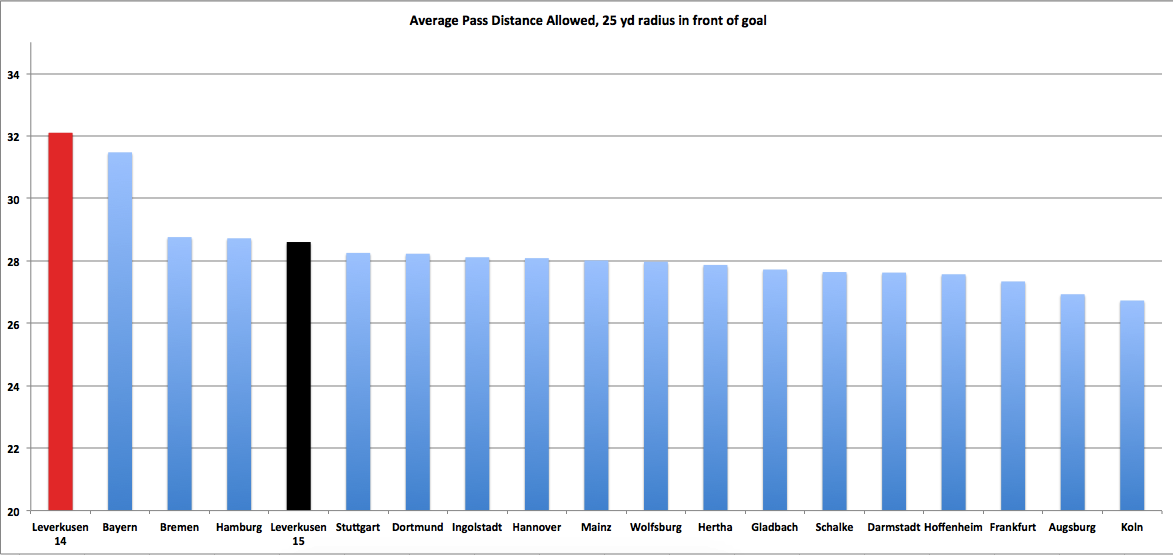 I don't quite understand why it has to be one or the other i.e. why can't Leverkusen be the pressing machine of last season that harries opponents without the ball while playing more calmly with better ball control like this season. They remain the 3rd best team in the league and the most likely of "the rest" to grab Champions League but I really hope we see Schmidt figure it out, because there is a lot more potential here than a team that's slightly better than Gladbach and Wolfsburg.
I don't quite understand why it has to be one or the other i.e. why can't Leverkusen be the pressing machine of last season that harries opponents without the ball while playing more calmly with better ball control like this season. They remain the 3rd best team in the league and the most likely of "the rest" to grab Champions League but I really hope we see Schmidt figure it out, because there is a lot more potential here than a team that's slightly better than Gladbach and Wolfsburg. 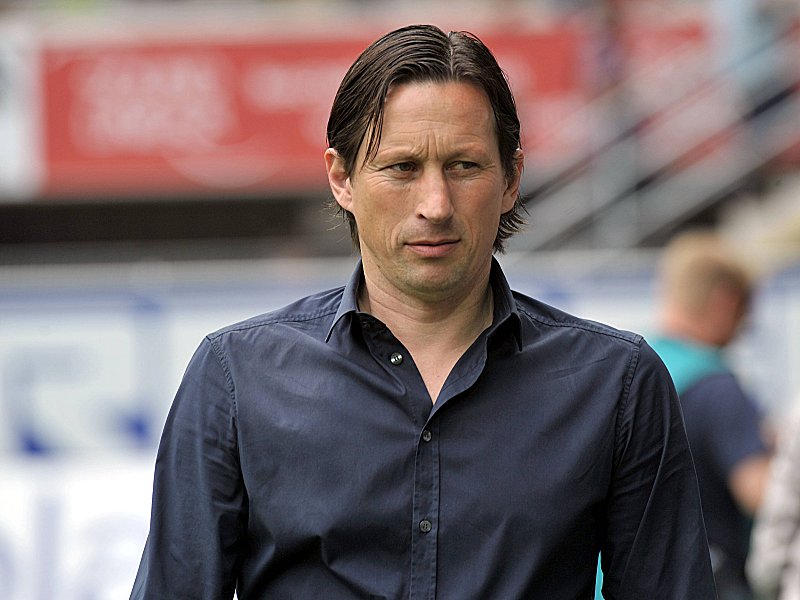
 A little experiment here. Try to guess who is Team A and who is Team B.
A little experiment here. Try to guess who is Team A and who is Team B.  Team B is Hertha Berlin of this season. Clever readers might have sniffed me out and beat me to the shocking reveal at Team A is Hertha Berlin from last season. For those unaware, last season Hertha escaped outright relegation by a single point. This year their shot and deep completion data look essentially exactly the same and they sit in the Champions League spots in 3rd place. Now some things have changed like shot distances being a bit better, but the main difference is Hertha have been much luckier. They are a little better, mainly at holding possession. Last year they had 42% possession, comfortably bottom of the league. This year they are up at 49%. Their completion map shows they are actually showing up a bit this season.
Team B is Hertha Berlin of this season. Clever readers might have sniffed me out and beat me to the shocking reveal at Team A is Hertha Berlin from last season. For those unaware, last season Hertha escaped outright relegation by a single point. This year their shot and deep completion data look essentially exactly the same and they sit in the Champions League spots in 3rd place. Now some things have changed like shot distances being a bit better, but the main difference is Hertha have been much luckier. They are a little better, mainly at holding possession. Last year they had 42% possession, comfortably bottom of the league. This year they are up at 49%. Their completion map shows they are actually showing up a bit this season. 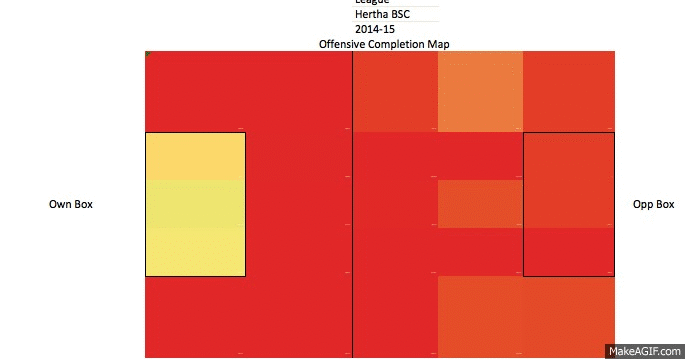 Vladimir Darida has partnered with Per Skjelbred to give Hertha a foothold in midfield. Last year the midfielders were completing around 75%, this year they are at 85%. This foothold and more importantly, the addition of Vedad Ibisevic up top, has let Hertha build a platform to actually compete at a league average rate in front of opposition goal. Last year they completed a historically low rate of passes in front of goal, this year they can actually complete a few of their very passes in front of goal. This improved ball control and competency around goal only counts for so much though, their fundamental numbers are still terrible. They are trailing much less this season, so I expect the base stats to rise a bit in the second half of the season but it won't be good news for Hertha fans. Those stats should rise because they will be trailing more, this still is far from an above average side. A top 6 finish would be fantastic. Gladbach
Vladimir Darida has partnered with Per Skjelbred to give Hertha a foothold in midfield. Last year the midfielders were completing around 75%, this year they are at 85%. This foothold and more importantly, the addition of Vedad Ibisevic up top, has let Hertha build a platform to actually compete at a league average rate in front of opposition goal. Last year they completed a historically low rate of passes in front of goal, this year they can actually complete a few of their very passes in front of goal. This improved ball control and competency around goal only counts for so much though, their fundamental numbers are still terrible. They are trailing much less this season, so I expect the base stats to rise a bit in the second half of the season but it won't be good news for Hertha fans. Those stats should rise because they will be trailing more, this still is far from an above average side. A top 6 finish would be fantastic. Gladbach 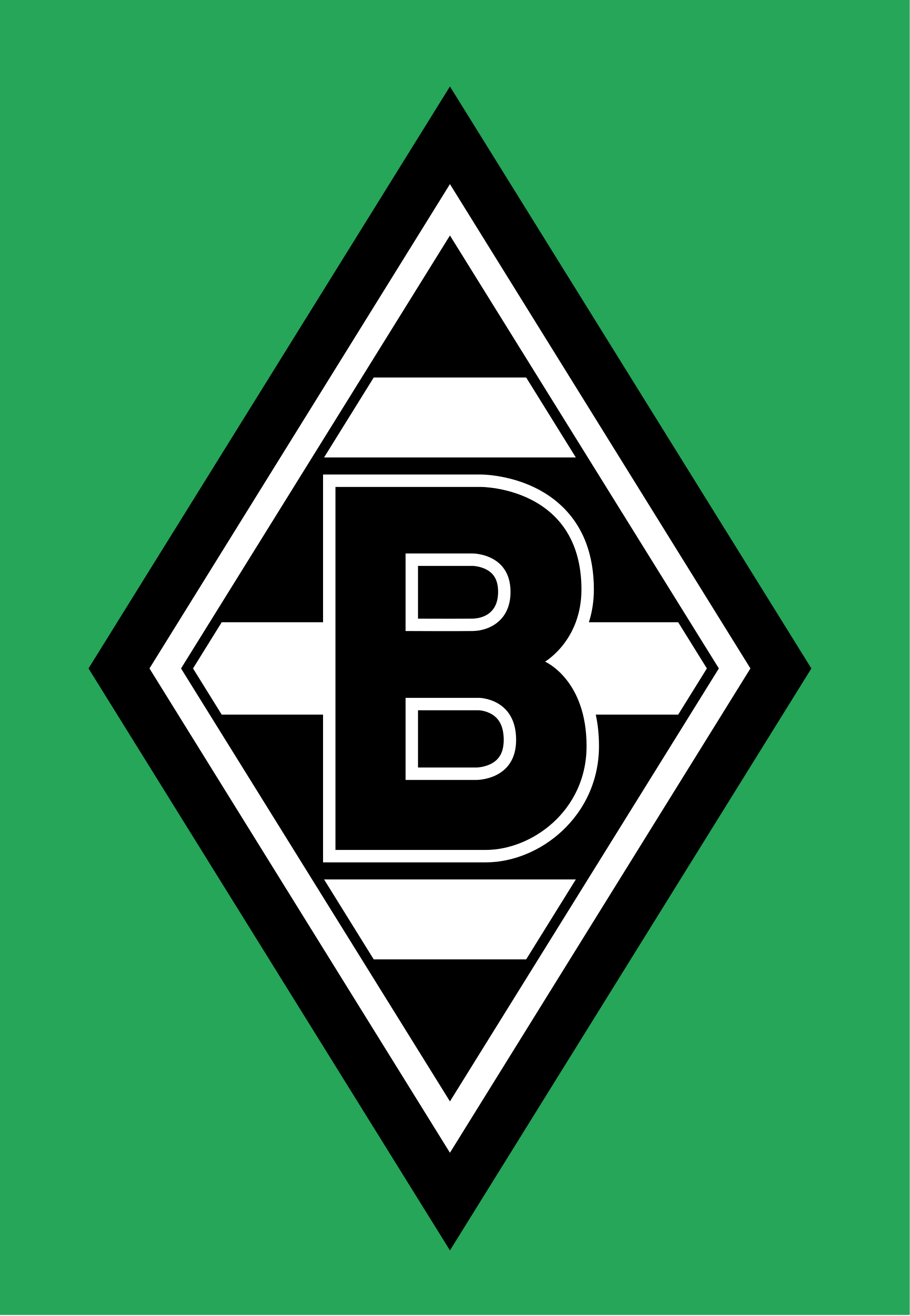
 Gladbach have been a fascinating case for stat-guys due to their continued "over-performance" of their shot stats. I wrote last year that their system under Lucien Favre was set up to perform at a higher level than their shots indicated, but then this year started and it all came crashing down. Nothing worked like the previous years and Favre stepped down after a 5 games, 5 losses, 5 awful performances start. Andre Schubert took over and immediately turned things around: Gladbach finished in 4th and he won Kicker's poll for manager of the season. What did he change?
Gladbach have been a fascinating case for stat-guys due to their continued "over-performance" of their shot stats. I wrote last year that their system under Lucien Favre was set up to perform at a higher level than their shots indicated, but then this year started and it all came crashing down. Nothing worked like the previous years and Favre stepped down after a 5 games, 5 losses, 5 awful performances start. Andre Schubert took over and immediately turned things around: Gladbach finished in 4th and he won Kicker's poll for manager of the season. What did he change?
- He's started pressing. Nothing crazy like Ingolstadt or Leverkusen, but under Schubert the Foals are at least league average when it comes to forcing opponents into losing the ball high up the pitch. This was used to great effect in arguably the best performance by any German team this year, Gladbach's 3-1 dismantling of Bayern.* Even just league average pressing is a large change from last years passive defense, which was well over a standard deviation below average when it came to the high press.https://vimeo.com/147949104 *to contextualise how impressive that game was:
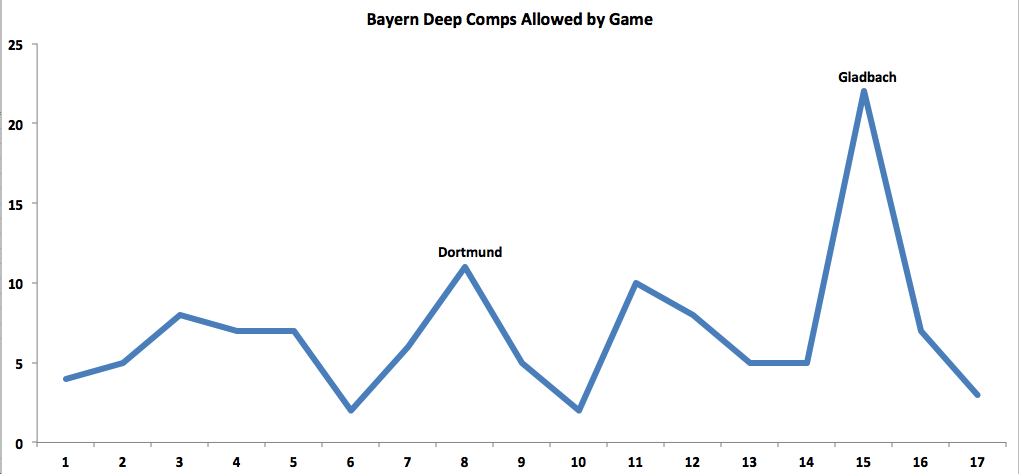
- They allow shots a lot more directly. Last year Gladbach opponents were forced to play sideways and backwards in the final third at a rate 3 standard deviations above the league average. This set D forced shots from a high distance, blocked a lot of shots, and generally pressured shooters very well. This year that's gone: they are essentially league average in all those categories.
- Flipped the positioning of the two forward players. Raffael seems to have taken the more advanced Max Kruse role from last season (while playing a little more directly), while Lars Stindl has found a home up the pitch in the Raffael 2014 role after being less effective further back in midfield at the start of the year.
- To fill the Kramer role (which Stindl was supposed to), Schubert has plugged in Mahmoud Dahoud. The young Syrian has been a more attacking player than Kramer was but has eased some of the overwhelming ball-carrying load Xhaka was carrying at the start of the year. The approximately 130-pound youngster is an exciting player to watch as he develops as he has shown the ability to range forward for an assist or a shot. I'll repeat my Weigl advice for Dahoud: 100 pushups and mix in some PB&J's for strength gain.
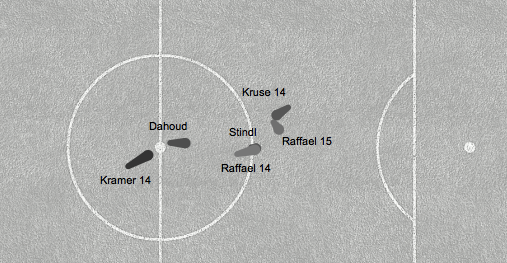 Those positional tweaks aside, with the ball things really aren't too much different when you look at the team-wide metrics. Gladbach still complete a huge percentage of their passes, they are still great around the goal, are patient all over the pitch, and are still converting well above what shot models would expect them to (for example, Michael Caley's model has them scoring 10 more goals than expected). Maybe this isn't that surprising, they still have great passers of the ball up front with Raffael and Lars Stindl. Gladbach are in an interesting position where they are no longer doing any of the things that helped them keep goals allowed so far below what their shots indicated these past three years but still are performing well, mainly from a continued efficient attack. The key metric to watch in the second half will be shots and deep completions allowed. For Schubert to prove he's a coach that can keep Gladbach among the top UCL contenders he will need to get these well below the Favre-era numbers and probably below the league average. They played the most promising game of the season with their beatdown of Bayern, so we know a very good team is in there, we just need to see it over the final 17 games to be sure. Wolfsburg Looked more in-depth at them here. The New Boys Ingolstadt
Those positional tweaks aside, with the ball things really aren't too much different when you look at the team-wide metrics. Gladbach still complete a huge percentage of their passes, they are still great around the goal, are patient all over the pitch, and are still converting well above what shot models would expect them to (for example, Michael Caley's model has them scoring 10 more goals than expected). Maybe this isn't that surprising, they still have great passers of the ball up front with Raffael and Lars Stindl. Gladbach are in an interesting position where they are no longer doing any of the things that helped them keep goals allowed so far below what their shots indicated these past three years but still are performing well, mainly from a continued efficient attack. The key metric to watch in the second half will be shots and deep completions allowed. For Schubert to prove he's a coach that can keep Gladbach among the top UCL contenders he will need to get these well below the Favre-era numbers and probably below the league average. They played the most promising game of the season with their beatdown of Bayern, so we know a very good team is in there, we just need to see it over the final 17 games to be sure. Wolfsburg Looked more in-depth at them here. The New Boys Ingolstadt  The newly-promoted side have been one of the most fascinating teams in the league. They've scored a brutal 11 goals, by far least in the league, but have also allowed fewer goals than anyone but Bayern (17). The average Ingolstadt game has seen 1.7 goals, which is about 35 minutes worth of a Dortmund game. Taking the facts I've laid out so far, you'd expect Ingolstadt to be a boring, conservative team that sits deep to try and lower the shot quality. You'd also be wrong. Austrian manager Ralph Hasenhüttl isn't directing his players to do anything fancy or impressive when Ingolstadt have the ball: they are playing the 2nd longest passes and have the 2nd-lowest completion % in the league. They've used this attack limitation and turned it into an advantage on defense. Ingolstadt's attacking possessions end 3 yards closer to the opposition goal than all but one other team, they then use this directness to push the press high. And they really press high:
The newly-promoted side have been one of the most fascinating teams in the league. They've scored a brutal 11 goals, by far least in the league, but have also allowed fewer goals than anyone but Bayern (17). The average Ingolstadt game has seen 1.7 goals, which is about 35 minutes worth of a Dortmund game. Taking the facts I've laid out so far, you'd expect Ingolstadt to be a boring, conservative team that sits deep to try and lower the shot quality. You'd also be wrong. Austrian manager Ralph Hasenhüttl isn't directing his players to do anything fancy or impressive when Ingolstadt have the ball: they are playing the 2nd longest passes and have the 2nd-lowest completion % in the league. They've used this attack limitation and turned it into an advantage on defense. Ingolstadt's attacking possessions end 3 yards closer to the opposition goal than all but one other team, they then use this directness to push the press high. And they really press high: 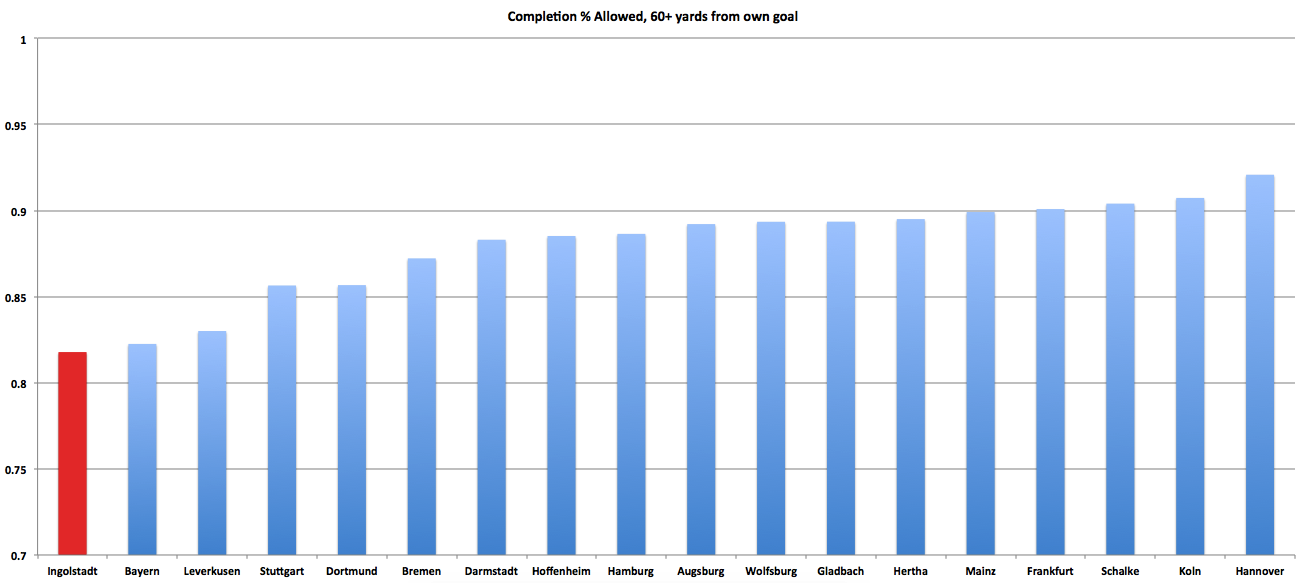 Not even the crazy pressure of Bayern and Leverkusen has topped Ingolstadt's. They've been able to win the ball back higher than anyone but Bayern, and though they haven't turned this into any semblance of a quality attack they are winning the field position battle in a significant way to shut down games. Ingolstadt have avoided the Celta/Rayo/last year Tottenham trap of the high pressing team that is easy to cut open at the back, opponents are actually below average at completing passes around goal. I would love to see what this style can do with a few more highly skilled attackers added in. Because when it comes to attackers, Ingolstadt might just have one. The insane reliance on Pascal Groß is almost comical. The 2nd-most key passes on Ingolstadt have come from Matthew Leckie, with 18. Groß has 49. As mentioned last week, Groß has more key passes than anyone else in the Bundesliga. With this one-man reliance comes some serious symmetry problems: Ingolstadt have 57 chances created from passes on the far right of the pitch and just 22 on the left, no other team comes close as you'd expect.
Not even the crazy pressure of Bayern and Leverkusen has topped Ingolstadt's. They've been able to win the ball back higher than anyone but Bayern, and though they haven't turned this into any semblance of a quality attack they are winning the field position battle in a significant way to shut down games. Ingolstadt have avoided the Celta/Rayo/last year Tottenham trap of the high pressing team that is easy to cut open at the back, opponents are actually below average at completing passes around goal. I would love to see what this style can do with a few more highly skilled attackers added in. Because when it comes to attackers, Ingolstadt might just have one. The insane reliance on Pascal Groß is almost comical. The 2nd-most key passes on Ingolstadt have come from Matthew Leckie, with 18. Groß has 49. As mentioned last week, Groß has more key passes than anyone else in the Bundesliga. With this one-man reliance comes some serious symmetry problems: Ingolstadt have 57 chances created from passes on the far right of the pitch and just 22 on the left, no other team comes close as you'd expect. 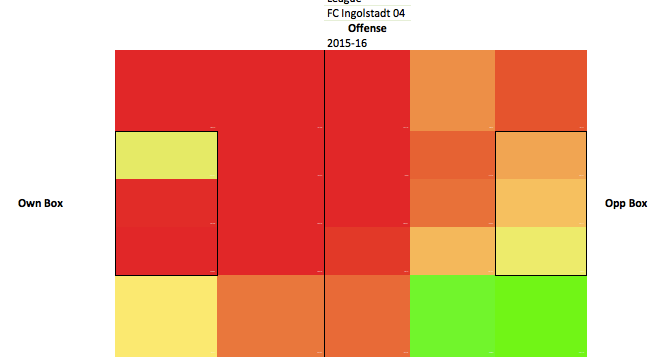 Stop Groß and guard your left when you play Ingolstadt. They look to be reasonably safe 5 places above relegation and it will be interesting to see the super-defensive side evolve. Darmstadt
Stop Groß and guard your left when you play Ingolstadt. They look to be reasonably safe 5 places above relegation and it will be interesting to see the super-defensive side evolve. Darmstadt  The long ball kings. What happens when your only strategy with the ball is simply heaving it forward and long.
The long ball kings. What happens when your only strategy with the ball is simply heaving it forward and long. 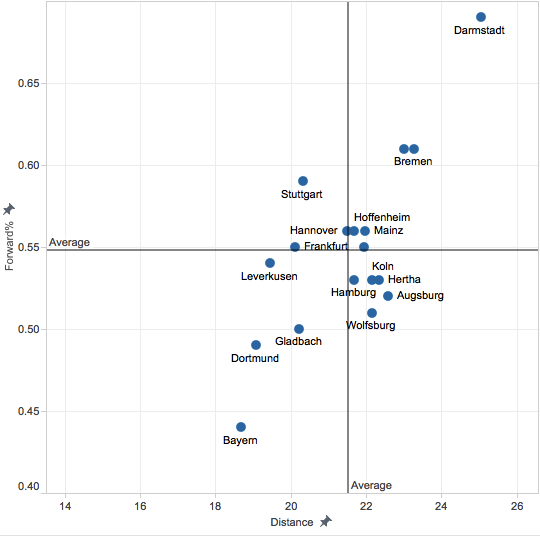 Unsurprisingly this approach has led to 37% possession and 56% pass completion. This long-ball game waned a bit as the season went on, as they played more like a normal team. The first 5 games, their average pass length was above 28 yards before falling down sub 25 the rest of the year. They almost had to cut it down a bit, at one point a couple months into the season they had completed 5 passes in a row once. One time. As you can see from their summary table, they have been relegation worthy in territory control but surprisingly have been shooting from very close and forcing opponents to shoot from far out. That seems very unlikely to hold up and the lack of a real way to keep possession means they will be one of the favorites to go down, even with the 3 point edge on 16th they hold right now. Biggest Fallers Hannover and Hoffenheim have collapsed. Last year Hoffenheim threatened for a Europa League spot and got passed by Dortmund right at the end of the season. This year they are dead last. Hannover are right above them, still reeling from losing Mr. Everything Lars Stindl. Neither team can keep opponents from just pouring in on their goal:
Unsurprisingly this approach has led to 37% possession and 56% pass completion. This long-ball game waned a bit as the season went on, as they played more like a normal team. The first 5 games, their average pass length was above 28 yards before falling down sub 25 the rest of the year. They almost had to cut it down a bit, at one point a couple months into the season they had completed 5 passes in a row once. One time. As you can see from their summary table, they have been relegation worthy in territory control but surprisingly have been shooting from very close and forcing opponents to shoot from far out. That seems very unlikely to hold up and the lack of a real way to keep possession means they will be one of the favorites to go down, even with the 3 point edge on 16th they hold right now. Biggest Fallers Hannover and Hoffenheim have collapsed. Last year Hoffenheim threatened for a Europa League spot and got passed by Dortmund right at the end of the season. This year they are dead last. Hannover are right above them, still reeling from losing Mr. Everything Lars Stindl. Neither team can keep opponents from just pouring in on their goal: 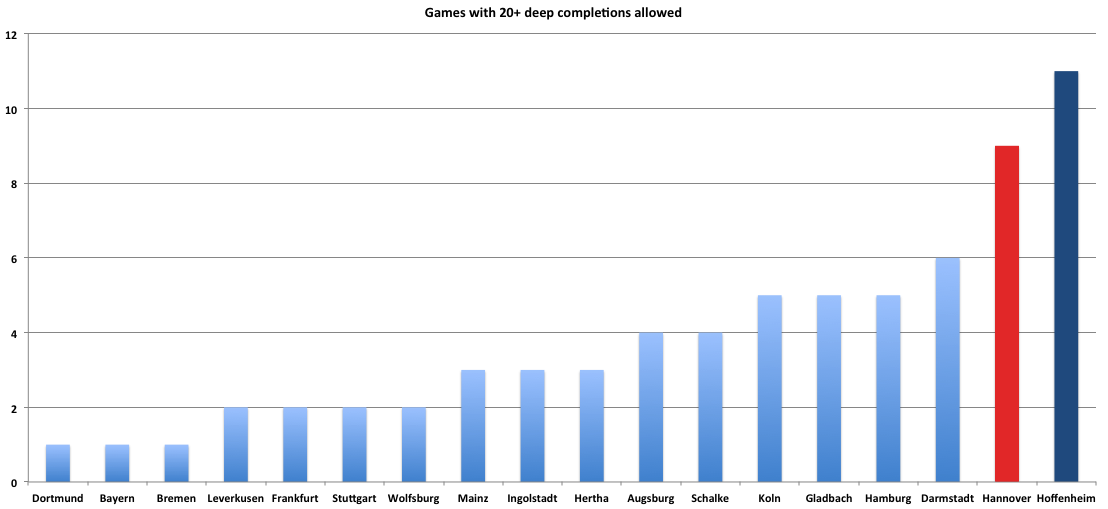 and can't ever put sustained pressure on the opposition:
and can't ever put sustained pressure on the opposition: 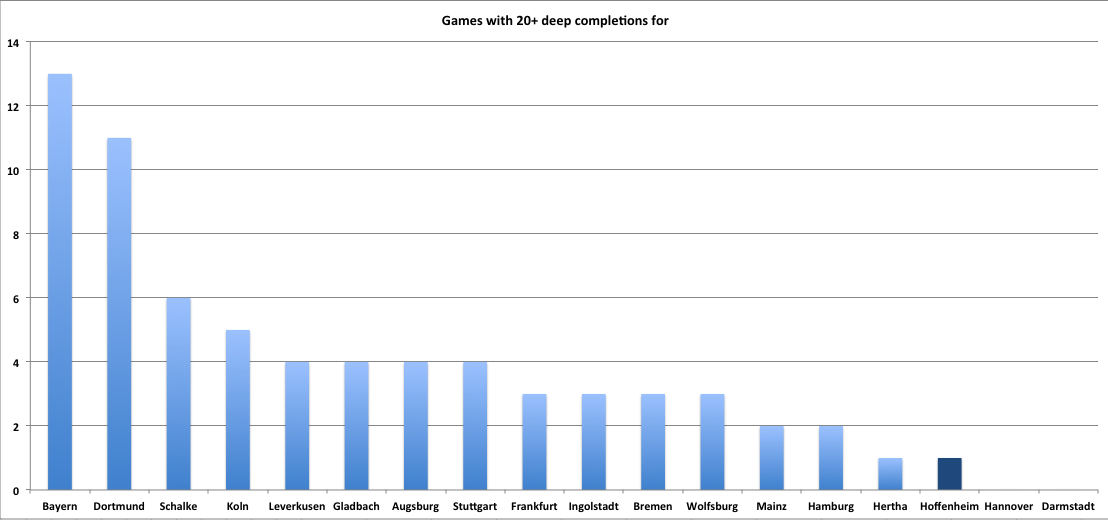 Hannover looks the most hopeless, they are the leading favorite for relegation. Hoffenheim are bad, but not quite as bad, and have some interesting elements that make them more interesting to watch. They might have the only player in a major league who could plausibly feature for the Afghani national side in Nadiem Amiri and they have also have appointed a 28-year old coach in Julian Nagelsmann for next season, who could become the youngest coach in Bundesliga history if they stay up.
Hannover looks the most hopeless, they are the leading favorite for relegation. Hoffenheim are bad, but not quite as bad, and have some interesting elements that make them more interesting to watch. They might have the only player in a major league who could plausibly feature for the Afghani national side in Nadiem Amiri and they have also have appointed a 28-year old coach in Julian Nagelsmann for next season, who could become the youngest coach in Bundesliga history if they stay up. 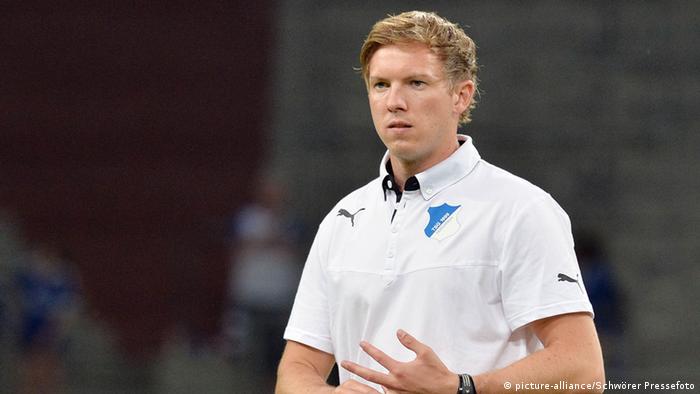
 Of the teams returning to the Bundesliga from last season, none allowed more deep completions than Koln and only Hertha had fewer on the attacking side. Their shots had also come from the furthest distance away and they took the 2nd-fewest shots. There were all kinds of danger signals emanating from this side, but this year those concerns have mostly faded away. No team has improved their deep completion total more (Koln is +4.3/game), no team has improved their average shot distance more (3 yards closer), and only Stuttgart have seen a larger jump in shots (Koln have added 1.7 shots). Anthony Modeste has found himself in some pretty impressive company across Europe as the tip of this sharpened Koln spear.
Of the teams returning to the Bundesliga from last season, none allowed more deep completions than Koln and only Hertha had fewer on the attacking side. Their shots had also come from the furthest distance away and they took the 2nd-fewest shots. There were all kinds of danger signals emanating from this side, but this year those concerns have mostly faded away. No team has improved their deep completion total more (Koln is +4.3/game), no team has improved their average shot distance more (3 yards closer), and only Stuttgart have seen a larger jump in shots (Koln have added 1.7 shots). Anthony Modeste has found himself in some pretty impressive company across Europe as the tip of this sharpened Koln spear. 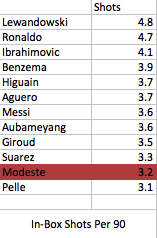 Their attack is extremely cross-heavy, the top 2 key pass providers are fullbacks Hector and Risse and their pass in the final 25 yards is longer than anyone's but Hannover and fellow crossers Wolfsburg. This is not a team that spends time with complicated interplay, it throws the ball forward into the box.
Their attack is extremely cross-heavy, the top 2 key pass providers are fullbacks Hector and Risse and their pass in the final 25 yards is longer than anyone's but Hannover and fellow crossers Wolfsburg. This is not a team that spends time with complicated interplay, it throws the ball forward into the box. 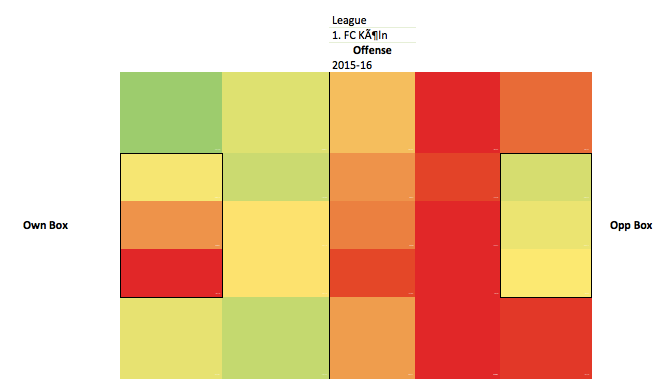 And if you've heard all about the frantic pace and high pressing of the Bundesliga, don't watch Koln. They've pressed less than any other team but Hannover this season. Even if the style is a bit brutalistic, it's working and Koln is playing a lot more like a comfortable mid-table team this year. Others Werder Bremen and Stuttgart are two fascinating cases. Both have seen their fundamental numbers climb signficantly from last season but both are sitting in relegation places right now. Their underlying numbers probably overrate both teams as they have both trailed 37% of the time, more than anyone bar Hannover. However, the table likely underrates them. Neither are among the top candidates to go down and I expect both to perform more like mid-table teams. I wrote about Stuttgart's fascinating season here. My recommendation for Stuttgart is try a little less Kostic with his sloppiness with the ball, and play more Rupp and Maxim. Sell Kostic if you can get the huge fee he's rumored to be commanding. Also, see if you can determine the stylistic change from Zorniger to Kramny:
And if you've heard all about the frantic pace and high pressing of the Bundesliga, don't watch Koln. They've pressed less than any other team but Hannover this season. Even if the style is a bit brutalistic, it's working and Koln is playing a lot more like a comfortable mid-table team this year. Others Werder Bremen and Stuttgart are two fascinating cases. Both have seen their fundamental numbers climb signficantly from last season but both are sitting in relegation places right now. Their underlying numbers probably overrate both teams as they have both trailed 37% of the time, more than anyone bar Hannover. However, the table likely underrates them. Neither are among the top candidates to go down and I expect both to perform more like mid-table teams. I wrote about Stuttgart's fascinating season here. My recommendation for Stuttgart is try a little less Kostic with his sloppiness with the ball, and play more Rupp and Maxim. Sell Kostic if you can get the huge fee he's rumored to be commanding. Also, see if you can determine the stylistic change from Zorniger to Kramny: 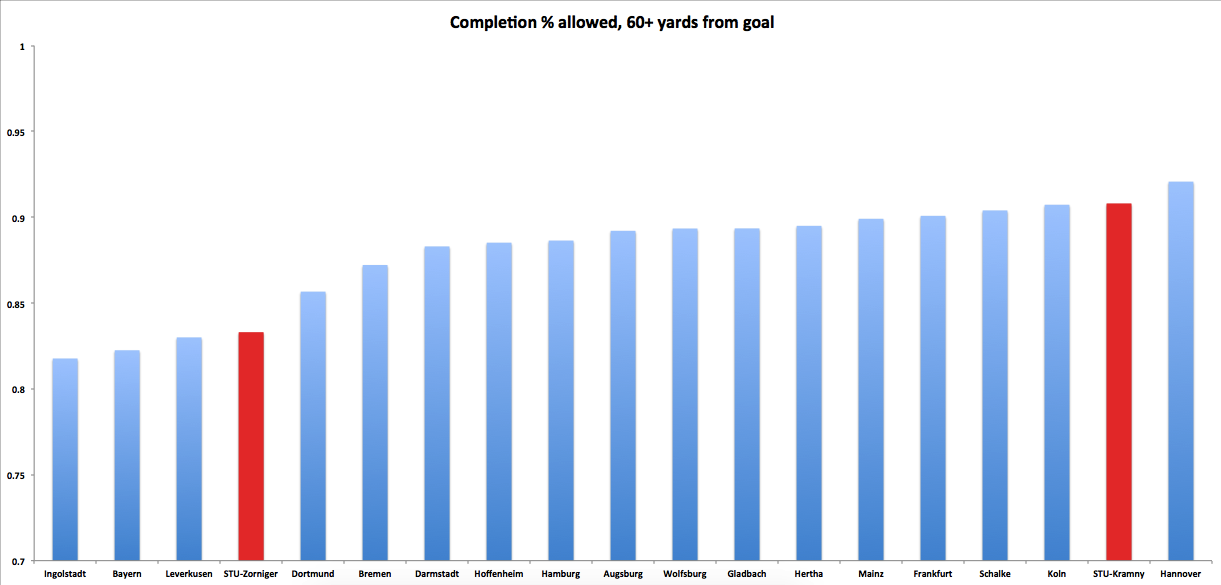 That's it for the Bundesliga at the Break. Even with the title essentially sown up, it should be a great second half up and down the league table. Hopefully this has helped you get ready for it.
That's it for the Bundesliga at the Break. Even with the title essentially sown up, it should be a great second half up and down the league table. Hopefully this has helped you get ready for it.
